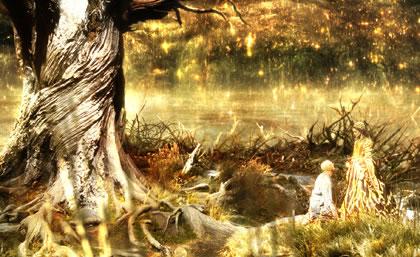A movie out this week in the United States seeks to explore mankind's persistent struggle against death, through a triple-stranded plot in three different eras. In The Fountain, Hugh Jackman plays a sixteenth-century conquistador searching for the fountain of youth; a twenty-first-century neurologist who's researching brain tumors because his wife has one; and a beatific astronaut in the future, who flies through nebulas in a more spiritual pursuit of the meaning of life.
 Bold and beautiful: but what does it have to say about the roles of science and spirituality in understanding life and death?Warner Bros. Pictures
Bold and beautiful: but what does it have to say about the roles of science and spirituality in understanding life and death?Warner Bros. PicturesWhile the film is only loosely about science, the story's writers both have an interest in scientific issues: one holds a PhD. Emma Marris talks to co-writer Ari Handel and co-writer/director Darren Aronofsky (also director of Requiem for a Dream and Pi).
Ari Handel: What's your background in science?
I got a PhD in neurobiology at New York University. I had always been torn between science and humanities. I was very interested in science writing and science education. I originally went to graduate school with the idea that I would be a better communicator of science if I really saw what was inside the world of science.
Were you a sort of scientific advisor for this film?
Yes. My role was — or one of my roles — was to be the voice of science and the voice of research and of academic accuracy, wherever that was appropriate. With the lab science and the stuff that took place in the hospital, that was something I was watching over and researching, and even some of the spaceship design issues.
One of the things I learned, because I was naïve to the filmmaking process when I started, is how much of it is an illusion. It's all made up, so you have to control the entire universe that you are showing, and make sure it at least has some kind of internal consistency.
One could think that the film rejects science as a way to understand life and death. Was that the intended message?
I would say that the film is sort of neutral about science. If anything, it says that — and this applies to the conquistador character, the scientist character and the character in outer space — the attempt to understand, control and manipulate everything in your environment may be ineffectual. These characters are trying to control life, and that letting go a little bit and ceding some of that control may be a better way to go. Science brings us lots of insight about life and death, but like anything it is not absolute.
What's your general take on science in the movies?
When you see scientists in the movies they are often either megalomaniac mad scientist creatures, or a little bit unhinged, or they are bastions of rationalism who always do the right thing and keep their cool. In my experience scientists are human. What I'd like to see is scientists as people, because science has operated within society, so people should see it as it is: as people trying to do their best.
Darren Aronofsky: What's your background in science?
My dad taught geology in public school in Brooklyn. So I guess you are always fascinated by what your pop does. When I was in high school I was in a program called The School for Field Studies. It sends mostly college kids and some high-school kids into ecologically sensitive areas to do scientific research. So in 1986 I went with them to Kenya, and I studied water strategies in ungulates [hoofed animals], and then in 1987 I went with them to Prince William Sound, Alaska, and studied thermoregulation in harbour seals. And so, that background was always there for me, even though I didn't study science in college.
How do you feel about putting science into films?
When we did Pi, it was a really strange character to have as a lead in a film, a mathematician. There really weren't that many films out there doing it. I think it has changed a little bit, because I think in many ways the geeks and the nerds have won. The richest people in the world — Bill Gates and Paul Allen — are scientists. It has definitely changed the profile of what it means to be a scientist.
Does The Fountain support a rejection of science as a way to understand death?
ADVERTISEMENT
I am not sure science needs to be rejected. I think the point of the film is that western medicine and western science has done remarkable things as far as life extension over the last couple of centuries. But culturally, we kind of have a collective amnesia that mortality is actually part of our humanity. There is no way to escape death. In fact, if there was a way to escape death, perhaps we shouldn't even partake in that.
All the 'spirituality' in this film might put off some scientists. What do you say to them?
Science and spirituality do not contradict each other. The real message of the film is just recycling. We are all part of a fountain of matter and energy that has been passed down from the Big Bang.
Visit our squaresuptodeath.html">newsblog to read and post comments about this story.
